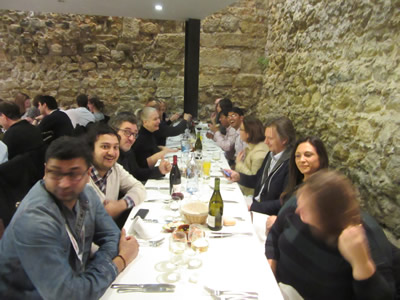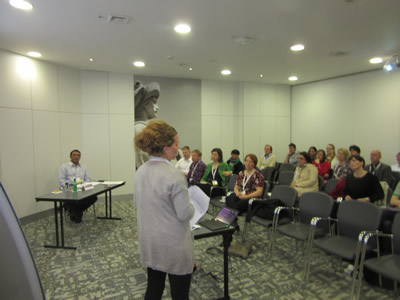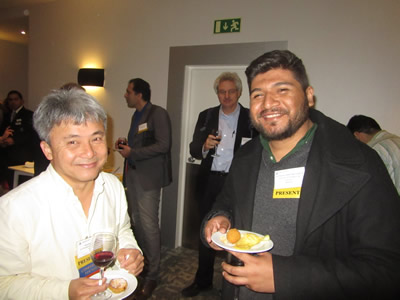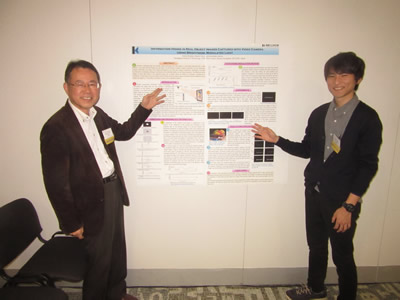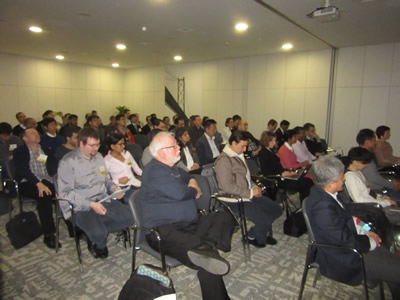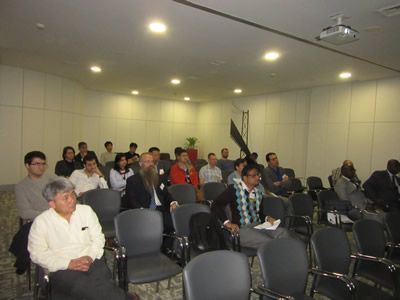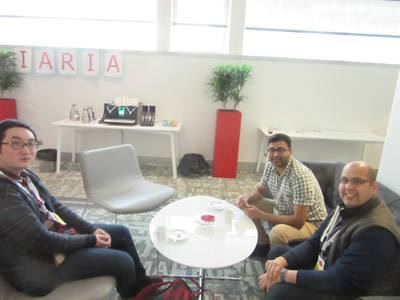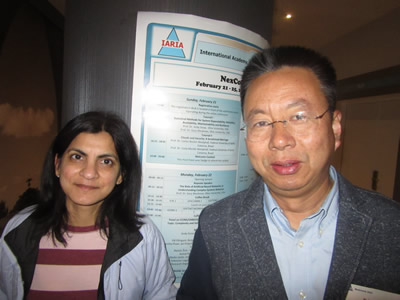CENTRIC 2022 - The Fifteenth International Conference on Advances in Human-oriented and Personalized Mechanisms, Technologies, and Services
October 16, 2022 - October 20, 2022
CENTRIC 2022
Onsite and Online Options: In order to accommodate a large number of situations, we are offering the option for either physical presence or virtual participation (pdf slides or pre-recorded videos).
ISSN: 2308-3492
ISBN: 978-1-61208-999-7
CENTRIC 2022 is colocated with the following events as part of SoftNet 2022 Congress:
- ICSEA 2022, The Seventeenth International Conference on Software Engineering Advances
- ICSNC 2022, The Seventeenth International Conference on Systems and Networks Communications
- CENTRIC 2022, The Fifteenth International Conference on Advances in Human-oriented and Personalized Mechanisms, Technologies, and Services
- VALID 2022, The Fourteenth International Conference on Advances in System Testing and Validation Lifecycle
- SIMUL 2022, The Fourteenth International Conference on Advances in System Simulation
- SOTICS 2022, The Twelfth International Conference on Social Media Technologies, Communication, and Informatics
- INNOV 2022, The Eleventh International Conference on Communications, Computation, Networks and Technologies
- HEALTHINFO 2022, The Seventh International Conference on Informatics and Assistive Technologies for Health-Care, Medical Support and Wellbeing
CENTRIC 2022 Steering Committee
| |
 |
Stephan Böhm
RheinMain University of Applied Sciences - Wiesbaden
Germany
|
|
 |
Tzung-Pei Hong
National University of Kaohsiung
Taiwan
|
| |
 |
Yasushi Kambayashi
NIT - Nippon Institute of Technology
Japan
|
|
|
|
CENTRIC 2022 conference tracks:
Building user-centric systems
User-centered research methods; User-centered methods for development and maintenance; Risks of user-centered design; Innovation and user-centered design; User-centered design in smart environments; Research on user competencies and requirements; Innovative user Interfaces (e.g., brain-computer interfaces); New types of human-computer-interactions (e.g., gestures)
Centric views
User centricity: I-centric versus We-centric; User-centric in service-centric systems; User-centric business models; User-centric requirements in network-centric approaches; User-centric and critical time-centric applications and services; User information access behavior; User-centric professional attackers; User-centric data mining; User-centric data aggregation; Personalized seeking and personalized sharing; Contextual user information facets; User-oriented ontology; User empowerment: awareness and control; User-centric trust models
User Centricity and Artificial Intelligence
AI-Support and Human Decision Making; Human Interpretable and Explainable AI; Data Annotation and Data Labeling Problems; Detecting and Dealing with AI Bias; User Acceptance of AI-Based Decision Making; AI for User Behavior Classification and Prediction; AI and Recommender Systems for Personalized Offerings
User Centered Design of Chatbots and Voice Assistants
User Requirements and User Acceptance; New Design Patterns and Approaches; Innovative Tools for Prototyping and Dialog Design; Wizard-of-Oz Testing and New Approaches for User Testings; Impact of Advances in Natural Language Detection; Methods for Analyzing and Classifying User Intents; Accessibility and Findability in Conversational Commerce
Affective computing and emotional intelligence
Frameworks for affective computing; Principles in emotional intelligence; Concepts in affective robotics; Social aspects of affective computing; Ambient systems embedding emotional intelligence; Empathy in artificial agents; Human-centric obedience towards virtual agents; Affective gaming; Deep multitask learning; Apps for body perceptions and emotions; Multi-sensing and human behavior; Active sensing system for distress detection; Recognition of facial emotions; Automatic prediction of depression and anxiety; Mitigate public speaking anxiety; Prediction of emotion from heartbeat; Conveying emotional awareness; Emotional intelligence; Happiness entailment; Cooperative machine learning; Emotion prediction; Emotion recognition; Emotion in ambiguous speech
Privacy and anonymity
Anonymity and pseudonymity; Attacks against de-identified data; Data anonymity; Consent-based privacy disclosure; Private digital assets; Disclosure control techniques; Information loss assessment; Risk assessment for shared information; Privacy and anonymity ontology; Privacy technologies; User location anonymity techniques; Privacy preserving data and text mining; Privacy and anonymity in specialized applications /healthcare. databases, information retrieval, social networks, etc./; Legal aspects in privacy and anonymity
User-centric supporting mechanisms
Machine learning and artificial neural networks; Network control and feedback with man-in-the-loop; Multi-sensor user interfaces (e.g., tactile, haptic, olfactory); Personalized storage and information retrieval with user-context; Service discovery using user profile; Personalized navigation and visualization; Semantic web services; Advanced personalization techniques for semantic wikis; Application of advanced reasoning maintenance; Reasoning on user modeling and personalization; Information extraction and semantic web technologies with personalization and user modeling; Quality of experience
Personalization
Personalization of ICT services and devices; Personalization of eHealth services; Personalization related to ICT in cars; Adaptive personalization; Supporting the user in initial set-up of user profiles; Personalization and user profile management; Preferences for personalization in manufacturers' devices; Standardization
User-centric networking and services
Personal profiles, preferences; Identity; Reputation; User profiles; Proximity and context-aware services; Social communities; User adapted services; Trust, privacy, security; Community services; Location services; Web 2.0 and Web 3.0; Key exchange, certificate handling, smartcards; Personal devices; Managing identity and security - identity provider; Home content access and rights management
User-centric advanced applications
Humanoids; Unmanned systems; On-body antennas; Body networks and devices; Preventive and personalized medicine; Anticipative systems for diagnosis and maintenance; Emergency and medical response systems; eHealth and telemedicine services; Personal entertainment
Technologies for personalized services
Personnel tracking; Presence automatic control; Remote home security control; User-centric recommender services; Identity management; Contactless radio: RFID, NFC; Proximity radio: Bluetooth, WLAN; Broadband and wireless broadband distribution; Ambient wireless and broadband networks; Social engineering and social networks; IPTV and Quadruple Play
People-centric sensing
People-centric sensing techniques, technologies, and applications; Participatory sensing; Smart phone sensing; urban sensing; Bio-medical sensing; Mixed sensor networks and people-centric sensing; SensorWeb; Mobility; Mobile social networks and sensing; Mobile healthcare and sensing; Platforms and architectures; Context awareness; Situation awareness and management
User experience and usability
Attributes and measurement; Ergonomics/human factors; User-Centered and contextual design; Design guidance/best practices; Usability heuristics, testing and evaluation; User feedback and response; Design tools and process; Prototyping technologies; Responsive design strategies; Innovative user interfaces
User research and usage behavior
Up-front user research; Use cases and case study research; Usage/user studies on new services; Adoption and diffusion research; Usage/demand forecasting and planning; Technology acceptance research; User behavior and attitudes; Social and cultural influences
Deadlines:
Submission | Jun 07, 2022 |
Notification | Jul 11, 2022 |
Registration | Jul 24, 2022 |
Camera ready | Jul 31, 2022 |
Deadlines differ for special tracks. Please consult the conference home page for special tracks Call for Papers (if any).








